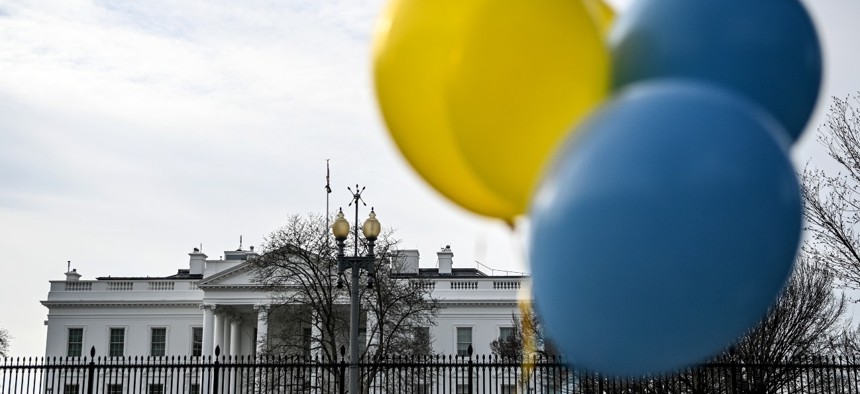
Britta Pedersen/picture alliance via Getty Images
Federal Contractors Could Soon Have to Disentangle Themselves Completely From Russia
A top House oversight Democrat says her bill limiting contracts with companies operating in Russia during the Ukraine war would supplement existing sanctions.
Lawmakers advanced a bill on Wednesday that would limit the federal government’s contracting with companies that are still operating in Russia amid its war with Ukraine.
Following Russia’s invasion of Ukraine in February, many companies started pulling out of Russia and Rep. Carolyn Maloney, D-N.Y., chairwoman of the House Oversight and Reform Committee, introduced a bill last month that would force federal contractors to do the same.
When addressing Congress on March 16, Ukrainian President Volodymyr Zelensky thanked the United States government for the sanctions, but asked lawmakers to do more to “make sure the Russians do not receive a single penny” of American money, Maloney noted during a committee business meeting on Wednesday. “I found a loophole,” Maloney said. “It’s the private contracting area, procurement, for the federal government. We spent over $640 billion a year and we traced $28 billion of it going to Russia.”
She said her bill would supplement sanctions against Russia and other efforts to end the war as it bans federal agencies from entering into, continuing, extending or renewing covered contracts for products or services from companies that are continuing to operate in Russia when the war in Ukraine is ongoing. Any existing contracts would be terminated no more than 30 days after the bill is enacted. The bill, as amended, would apply to prime contractors and major subcontractors.
There will be “reasonable exceptions” for products or services that are purchased to benefit Ukraine or for “basic human needs” as well as for situations in which the termination or prohibition of a contract would not be in the United States' national interest,” said the bill text. The president and Congress must be notified in advance, said a press release.
An amendment, which Maloney brought forth and the committee approved by voice vote along with the bill itself as amended, clarifies the waivers, ensures that companies aren’t penalized for actions in Russia “to support the suspension of business operations,” allows the Office of Management and Budget to expeditiously issue implementation guidance, directs OMB to use contactor input from public comments as much as feasible in implementing the act, and increases communication and flexibility for contractors, said the chairwoman.
So far, only Democrats have co-sponsored the bill.
Rep. James Comer, R-Ky., committee ranking member, said Russian President Vladimir Putin is a “war criminal” and that he appreciated Maloney’s efforts; however, he said the bill could be difficult to implement and could be consequential for American businesses and the federal government, including the military’s readiness.
“It would be nearly impossible for every contractor to certify that their supply chains are completely void of any component from Russia,” Comer said. “Further, the bill only gives a month for rulemaking, a timeline that is unlikely to be reached and leaves few opportunities for input from industry experts. This will likely leave contractors and contracting officers exposed with little to no guidance [on] how to proceed.”
Additionally, the agencies haven’t been able to fully evaluate the bill and the potential changes. Comer said that due to all the unknowns, he can’t support the bill, but suggested the committee hold a hearing on “the money Congress has already obligated to help us better understand what other steps we can be affirmatively taking to help Ukraine.”
Maloney contested his claims and said that she will continue to work with industry groups and OMB on the legislation.







